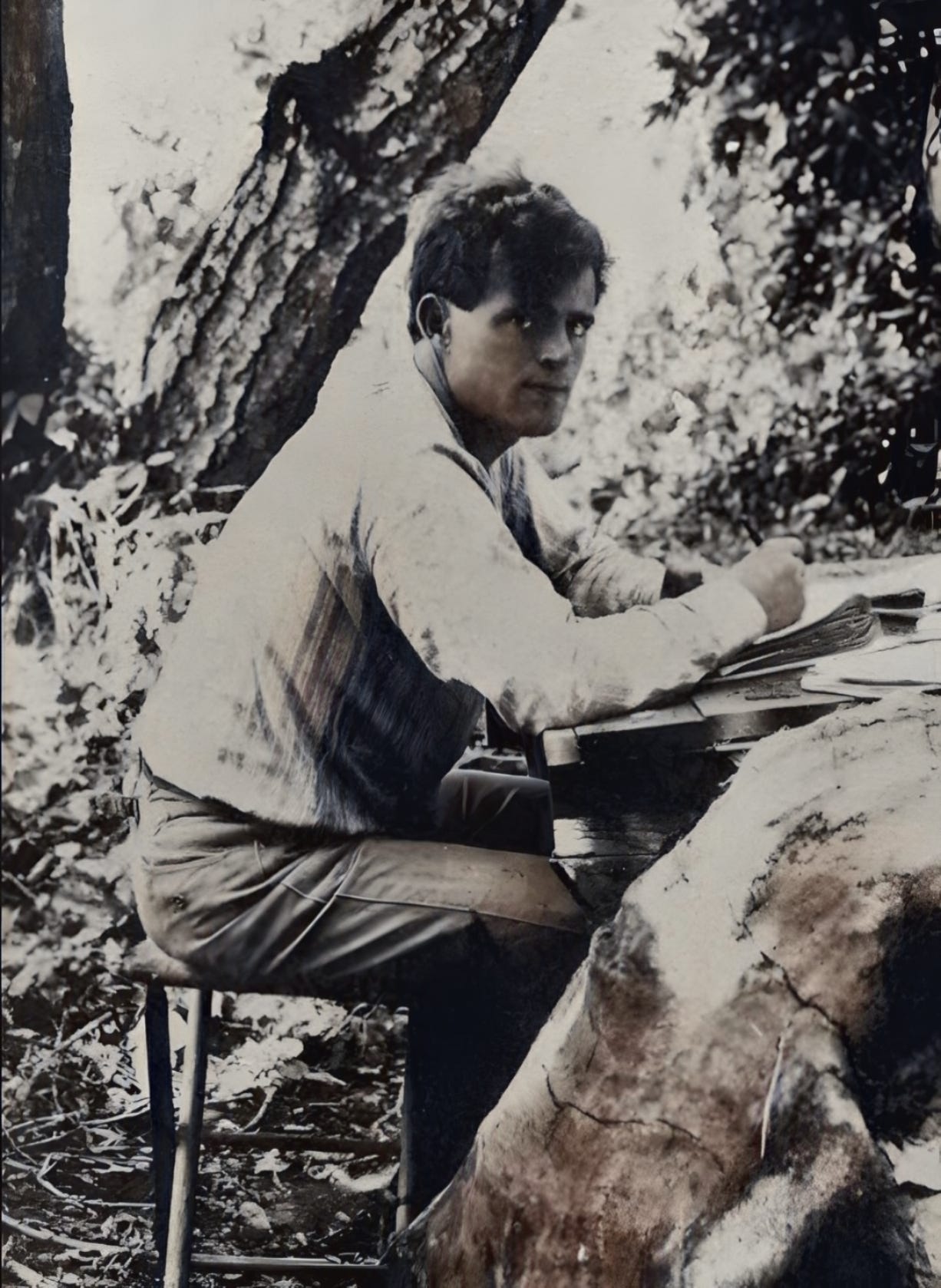Would Jack London's Ghost Rally Against Rep. Zoe Lofgren and Silicon Valley's Gilded Age?
Charlene Concepción Nijmeh Is London's Heir Apparent In The Battle For a Fairer California
By Richard Luthmann
Jack London, the quintessential adventurer, writer, and political activist, left an indelible mark as a Bay Area icon. His life and work continue to resonate over a century after his death.
Born and raised in Oakland, London's 40 years were packed with action and thoughtful advocacy for the underprivileged. He ventured into the harsh Klondike winters, navigated the tumultuous Pacific, covered wars as a correspondent, tangled with oyster pirates, and journeyed across continents.
Beyond his thirst for adventure, London was a vocal champion for the rights of working people, using his experiences and literary talent to spotlight the struggles and aspirations of the less fortunate. His legacy, rooted in his thrilling exploits and his commitment to social justice, cements him as a towering figure in the history of the Bay Area and beyond.
Born into the struggle of the San Francisco Bay area, Jack London's journey from a life of hard labor to becoming one of America's most celebrated authors imbued him with a profound sense of social justice. His experiences—whether shoveling coal or braving the Klondike—shaped his political views, leading him to espouse socialism vehemently. London's life was a testament to his belief in equity, famously stating, "Why should there be one empty belly in all the world when the work of ten men can feed a hundred?"
Silicon Showdown: Charlene Concepción Nijmeh vs. Zoe Lofgren
By Richard Luthmann
In California's 18th Congressional District, a pivotal race unfolds with national implications. On March 5, 2024, voters will decide on a representative and whether the district will turn progressive.
Jack London would likely find himself at odds with the current political landscape of California's 18th Congressional District, particularly with incumbent Zoe Lofgren's tenure. For a man whose life was a testament to both the thrill of adventure and the fight for the rights of the working class, London would be disenchanted with Lofgren's alignment with Big Tech and wealthy interests, a stark contrast to his socialist convictions.
Lofgren's extensive tenure, marked by substantial financial backing from Silicon Valley giants, represents the epitome of the capitalist excess London critiqued throughout his life. His writings and actions underscored a relentless pursuit of equity, often highlighting the disparities between the affluent and the working poor.
With her deep ties to Silicon Valley and a campaign chest filled by Big Tech, Zoe Lofgren represents the antithesis of London's ideals. For decades, Lofgren has navigated Washington's corridors of power, often prioritizing the interests of the wealthy over the needs of her constituents. London, who criticized the grip of moneyed interests on politics, would have found Lofgren's allegiance to Big Tech and her "Pay To Play" politics antithetical to his call for social equity.
London would likely critique Lofgren for pandering to the elite at the expense of the middle class and workers, those he dedicated his life to uplifting.

Enter Charlene Concepción Nijmeh, whose story echoes London's values. As Chairwoman of the Muwekma Ohlone Tribe and a successful entrepreneur, Nijmeh's economic development, healthcare, and environmental sustainability platform speaks directly to London's vision. Her dedication to living wage jobs, public safety, and education aligns with London's advocacy for the working class and his assertion that "Equity remains, which is to give like for like, the same for the same, neither more nor less."
Nijmeh emerges as a figure Jack London would have championed. London, who once said, "I would rather be ashes than dust! I would rather that my spark should burn out in a brilliant blaze than it should be stifled by dry rot," would have seen in Nijmeh a kindred spirit—a leader unafraid to blaze new trails for equity and justice in California.
California's 18th Congressional District Election 2024: A Bellwether For the Democratic Party Establishment?
By Richard Luthmann
The stage is set for a pivotal showdown in the 2024 U.S. House elections. California's 18th Congressional District, newly redrawn after the 2020 Census, covers Silicon Valley in the San Francisco Bay Area. The district, encompassing diverse communities, faces various pressing issues and may flip, becoming a progressive enclave.
Nijmeh's vision for California is one of transformation and renewal. She envisions a state where "opportunities abound for every community in every corner," a goal that aligns with London's dreams for societal equity. Her commitment to creating living wage jobs, enhancing public education, and prioritizing public safety echoes London's lifelong advocacy for the working class.
With her rich background in entrepreneurship, philanthropy, and tribal leadership, Nijmeh possesses the unique blend of experience and empathy that London believed essential for societal progress. Her efforts to divert millions of pounds of textiles from landfills through her recycling company demonstrate an innovative approach to environmentalism, a cause London would have championed, given his love for nature and adventure.
Housing is at the forefront of Nijmeh's platform, addressing California's crisis with a comprehensive strategy that echoes London's calls for equity. Her push for the Housing Access and Affordability Act of 2025 seeks to dramatically increase the supply of homes across all economic segments, a move London would have lauded as a step towards dismantling the economic disparities he so vehemently opposed.
The plight of the unhoused, a pressing issue in the San Francisco Bay Area, finds a champion in Nijmeh. Her approach to secure federal funding for transitional housing, drug treatment, and work programs mirrors London's concerns for the "sinless little ones" and their right to shelter and opportunity. This commitment to uplifting the most vulnerable members of society directly reflects London's socialist ideals.
Nijmeh's blueprint for a world-class mass transit system in the Bay Area, including expanding the BART system to San Jose and Silicon Valley, signifies her forward-thinking approach to infrastructure and sustainability. London, who appreciated the intricate relationship between man and nature, would have supported initiatives aimed at reducing environmental impact while improving the quality of life for working people.
In an era where climate change and energy innovation are critical, Nijmeh's call for leveraging the Bay Area's tech industry to transform America's energy mix would have found an advocate in Jack London. Her vision for a diverse renewable energy portfolio aligns with London's respect for the environment and his belief in the power of human ingenuity to overcome resource constraints.
Nijmeh also champions enhancing parks and public spaces, recognizing them as vital to societal well-being. This commitment to combating sprawl and preserving natural environments would have resonated with London, who saw beauty and freedom in the wild.
Protecting children on the internet is another cornerstone of Nijmeh's platform, addressing the modern challenges of digital safety and the responsibilities of Big Tech—a concern London, with his skepticism of unchecked capitalism, would have shared. Her proposals for new consumer protections reflect a dedication to safeguarding society's most vulnerable, a principle at the heart of London's work.
Nijmeh's comprehensive approach to public safety, mental health, and immigration reform underlines her commitment to a compassionate and equitable society. Her calls for holistic reentry programs, values education, and comprehensive immigration reform mirror London's advocacy for a society that offers support and opportunity to all its members, regardless of their circumstances.
Jack London's writings and speeches laid the groundwork for a vision of America characterized by social justice, environmental stewardship, and economic fairness. Charlene Concepción Nijmeh's campaign embodies these ideals, proposing tangible solutions to the pressing issues facing California and the nation.
As the 18th Congressional District's voters consider their choice on March 5, it's clear that Nijmeh's platform offers a path that aligns with Jack London's values and seeks to realize his vision for a fairer society. Her dedication to addressing the root causes of inequality, innovative solutions to contemporary challenges, and unwavering commitment to public service reflect a deep understanding of the interconnectedness of social, environmental, and economic issues.
In Nijmeh, the legacy of Jack London finds a new champion, promising to carry the torch of social progress into the heart of California's political arena. Her campaign is a call to action, urging voters to embrace a future where equity, opportunity, and compassion define the Golden State. As London himself might have said, a vote for Nijmeh is not just a vote for change—it's a vote to continue the battle for justice and equity that he embarked on over a century ago.
What do you think?









